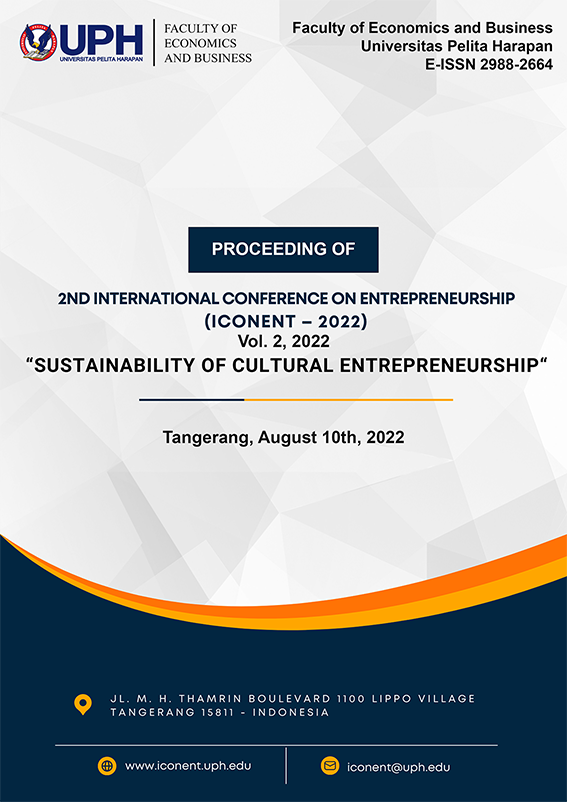THE EFFECT OF BONDED SOCIAL CAPITAL AND BRIDGING SOCIAL CAPITAL ON ENTREPRENEUR'S PERFORMANCE MODERATED WITH AWARENESS VARIABLES ON OPPORTUNITY AND OPERATIONAL COMPETENCY IN ENTREPRENEURS
Keywords:
bound social capital, bridging social capital, Awareness of opportunities, operational competence, entrepreneurial PerformanceAbstract
This study aims to identify the effect of bound social capital and to bridge social capital on entrepreneurial Performance, which is moderated by the variables Awareness of opportunities and operational competence of entrepreneurs. This research approach uses quantitative methods and data collection methods which are distributed through electronic questionnaires via a google form. This research is aimed at entrepreneurs, with a total of 160 respondents. The instrument used for collecting questionnaire data consists of 24 indicators. Testing the questionnaire was carried out with the reliability test method and validity test, and the tools used to analyze the data using the application smart-PLS 3.2.9. The results of the study explain that bound social capital has a positive effect on entrepreneurial Performance, bridging social capital has a positive effect on entrepreneurial Performance, operational competence does not moderate the positive influence between social capital that is tied to entrepreneurial Performance, operational competence moderates the positive effect of bridging social capital on entrepreneurial Performance, Awareness of opportunities does not moderate the positive influence between social capital that is tied to entrepreneurial Performance, Awareness of opportunities does not moderate the positive influence of social capital that bridges on entrepreneurial Performance.
References
Adnyana, Purnami. (2016). The Influence of Entrepreneurship Education, Self Efficacy And LKOus Of Control On Entrepreneurial Intentions. E-Journal of Unud Management, Vol. 5, No. 2, 2016: 1160-1188 ISSN: 2302-8912
Balau, A. 2016. "Definitions, Dimensions, Typology, Parameters, Indicators, and Opinions of Social Capital."
David, and Vienna, C. (2015) Entrepreneurship. Jakarta: Erlangga
Dunggio, M. (2017). The Influence of Social Capital and Intellectual Social Capital on Cooperative Empowerment and Community Welfare in Denpasar City. Sinta.And.Ac.Id.
Fields, John. (2010). Social Capital (Social Capital). Edition No. Nurhadi (Translator). Inyiak Ridwan Muzir (Ed.). Bantul: Discourse Creation.
Harahap, YES 2016. “Understanding, Form, Elements, Functions, Changes and Factors of SOCIAL CAPITAL.”
Mustusilo, YE (2019). "The 10 Best Entrepreneurial Competition Countries in the World, How Much is Report No.?". Kompas.Com. (Accessed on 20 No. 2022)
Herrero, I. (2018). How the family is the social capital of the family? Analyzing social capital ties in family and non-family firms. Bus Family. Revelation 31, 441- 459. Doi: 10.1177/0894486518784475
Hilman, I. (2017). Determination of Entrepreneurial Village and Its Development Strategy. JIMFE (Journal of Scientific Management, Faculty of Economics). Volume 3 No. 2 of 2017, p. 28-36
Jayani, DH (2021). "Indonesian MSMEs Increase by 1.98% in 2019". Databox.Katadata.co.id. (Accessed on 20 No. 2022)
Kivunja, C., and Kuyini, AB (2017). Understanding and Applying Research Paradigms in Educational Contexts. International Journal of Higher Education, 6(5), 26.
Kusmulyono, MS (2016). "The Role of Prior Knowledge and Sensitivity to the Ability to Identify Rural Micro Business Opportunities". Maranatha Management Journal. Vol. 16(1): pp 31-32.
Laura N, Sari RD, Setiawan I, Herdiyanti. 2018. The Role of Community Social Capital in Managing Natural Potential as a Survival Strategy in Limang Hamlet, Kelapa District, West Bangka Regency. Society Journal. 6(2): 74-82
Lin, Hsu, and Liang. (2017). SKOial Entrepreneurial Intentions of Students from Hong Kong. The Journal of Entrepreneurship Development Institute of India. Vol. 27(1) 47-64. DOI: 10.1177/0971355717738596
Meissner, R. (2016). Paradigms and theories in water governance: The case from South Africa's national water resources strategy, second edition. Water SA, 42(1), 1-10.https://doi.org/10.4314/wsa.v42i1.01
Mulyaningtiyas, RD (2018). Application of Structural Equation Modeling (SEM) in the study of Institutional Influence: Social Capital of Entrepreneurial Spirit on Business Performance of Tilapia Cultivation in Sleman Regency. Journal of Science Techno. Vol 7(2) : PP 83-154
Nikolaos G. There, 2015."Strategic Management PrKOess and the Importance of Structured Formality, No. and Non-No. Information, "European Research Studies Journal, European Research Studies Journal, vol. 0(2), pages 3-28.
https://ideas.repec.org/a/ers/journl/vxviiiy2015i2p3-28.html
Noviasari, Hdan Fathoni 2018 Analysis of the Influence of Entrepreneurial Learning Quality, Innovation Creativity, and Social Capital on Entrepreneurial Interest with Self-Efficacy as an Intervening Variable. Journal of Management. Vol.4 (4) http://jurnal.unpand.ac.id/No.php/MS/article/view/999/974
Pradana, BI, Safitri, R. (2020). The Influence of Entrepreneurial Motivation and Entrepreneurial Mentality on Entrepreneurial Interest. Iqtishoduna. Vol. 16(1): pp 73-82.
prima donna. (2016). The Role of Social Capital and Human Capital in Entrepreneurship. CINEMA. Vol.18 (2). 199-201http://fe.unp.ac.id/sites/default/files/uploadan/8.%20Primadon%20%28hal%20199-204%29_0.pdf
Purwanto, A. (2021). The World Economy during the Covid-19 Pandemic: from Impact to Projected Growth in 2021-2022. Kompaspedia.Kompas.id. (Accessed on 20 No. 2022)
Rahmawati, D., and Kartono, D. (2016) Social Capital and Traditional Markets (Case Study in Pasar Legi Kotagede No.). Journal of Sociology DILEMMA. 32(2).
Rahmini, N. (2020). "Social Capital of the Community No. to Overcome the Covid-19 Outbreak". Sep.Ulm.ac.id. (Accessed on 20 No. 2022)
Rahmini, N., Pudjihardjo, M., Hoetoro, A. And Manjilati, A., (2019). Social Capital Bonding in Lok Baitan Floating Market: Defensive Strategy of Barriers. Faculty of Economics and Administration, University of Malaya, 11(3), 145-159
Sekaran, U., and Bougie, R. (2016). Research Methods for Business : A Skill - Building Approach. West Sussex, UK : John Wiley and Sons Ltd.
Situmorang, AP (2021). “Average Ratio of Entrepreneurs in Developed Countries 12 Percent, No. Only 3.74 percent”. Liputan6.com. (Accessed on 20 No. 2022)

 Fakultas Ekonomi dan Bisnis | Universitas Pelita Harapan | Kampus Universitas Pelita Harapan | Gedung F Lt. 12 | Lippo Karawaci, Tangerang - 15811 | Telp 021-5460901 | Fax 54210992
Fakultas Ekonomi dan Bisnis | Universitas Pelita Harapan | Kampus Universitas Pelita Harapan | Gedung F Lt. 12 | Lippo Karawaci, Tangerang - 15811 | Telp 021-5460901 | Fax 54210992